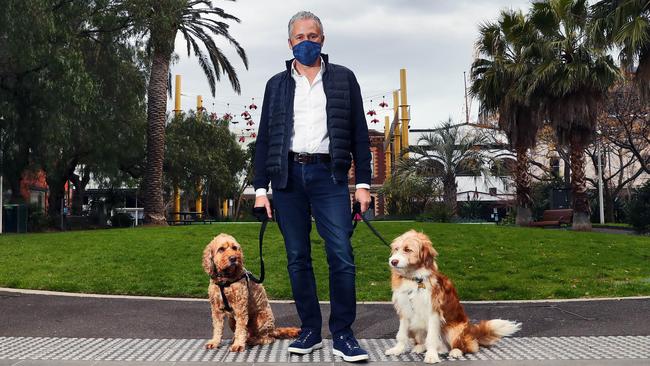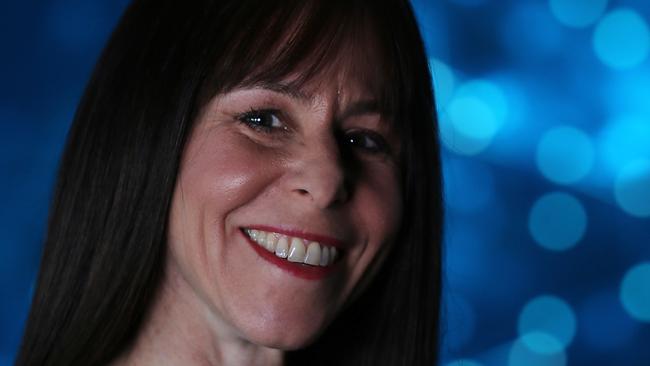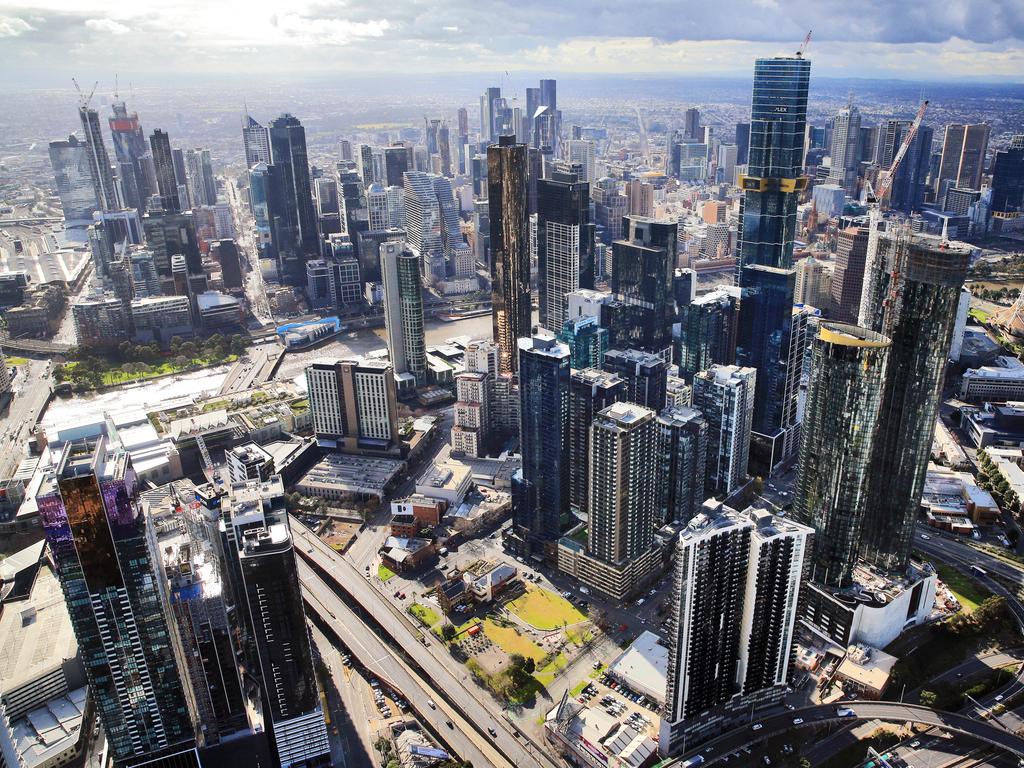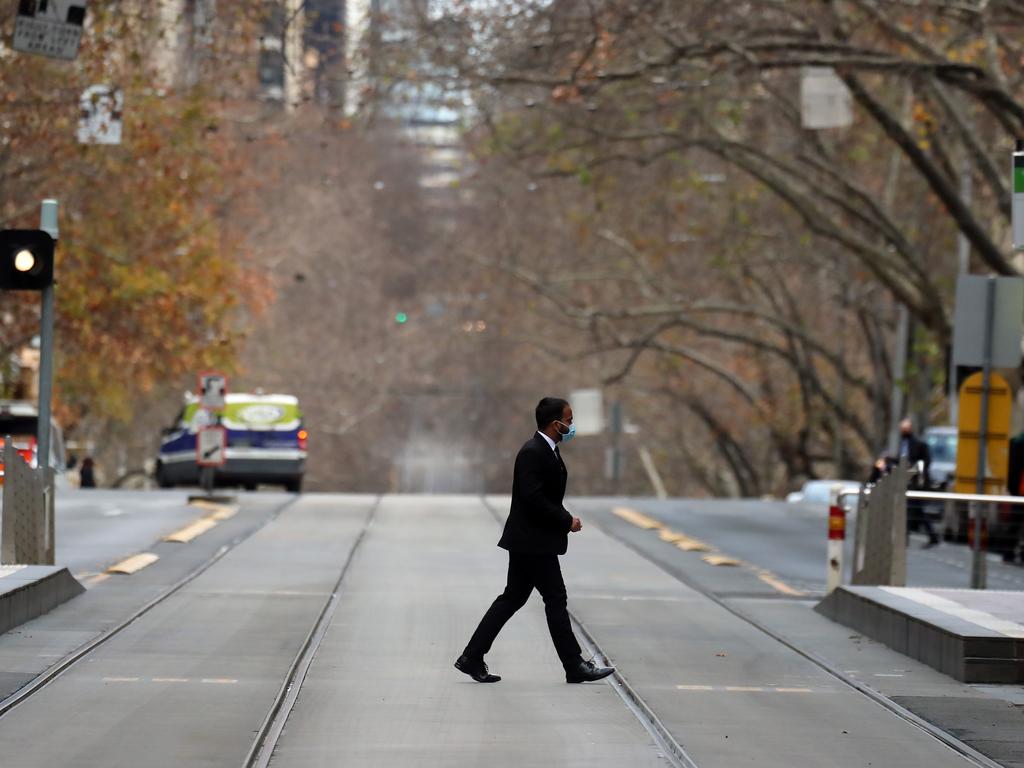Coronavirus: Window on home-work world changes views
Andy Penn jokes that it’s been one of his bigger challenges working from home during Melbourne’s COVID-19 lockdown.

Andy Penn jokes that it’s been one of his bigger challenges working from home during Melbourne’s COVID-19 lockdown.
Penn and wife Kallie Blauhorn are the proud owners of a six-month-old bordoodle puppy named Wolseley, after the former Englishman’s favourite all-day London restaurant in the heart of Piccadilly, next door to the Ritz Hotel.
Wolseley is sharing the three-storey, art-filled townhouse of Penn and Blauhorn in trendy inner-city Prahran with an older poodle, Mr Bennett, named after the famed late indigenous artist Nyurapayia Nampitjinpa, who was known as Mrs Bennett.
During our phone interview, there is a crash then a moment of pandemonium and the exclamations of a female voice before Penn hits the mute button.
When he returns, he apologises profusely for the interruption, which apparently has become commonplace for those regularly accustomed to speaking to the Telstra boss during the lockdown.
“When I speak to Andy on video, the dog is normally in the background. Quite a few people have got to know that dog very well,’’ says Telstra chairman John Mullen.
Penn — who used to do a day of work a month from home before the pandemic — hasn’t set foot in Telstra’s head-office tower in the Melbourne CBD for 21 weeks, and he’s proud of it.
Yes he misses face-to-face contact with staff, which started each day on a trip to the ground-floor cafe for his morning staple of coffee and Vegemite toast.
“I do miss the informal interactions that give you an opportunity to go to another level of intimacy with the business,’’ he says.
And he is worried about the impact of stage-four restrictions on the wellbeing of his Melbourne-based people.
But Penn wants his workforce of the future to be able to do their job from anywhere, a view shared by a number of the 10 executives interviewed by The Weekend Australian to discuss the workplace of the future.
The interviews reveal most companies are predicting a hybrid model, where three days a week in the office could become the norm in a post-COVID world, when the workplaces and CBDs of our cities will never look the same.
The best companies are busy making a virtue of the pandemic, as lockdowns have driven a massive take-up of technology that has transformed the working lives of their people.
There will far fewer commutes between the so-called “golden flying triangle” of Melbourne, Sydney and Brisbane for meetings that can be done virtually, which will have implications for not only travel budgets, but the embattled airline and hotel sectors.
“One of the things about COVID is it is changing people’s expectations and perspectives that you need to be face-to-face on everything. For example, do I really need to go to Sydney to have that meeting?” Penn says.
Some firms say they will inevitably reduce their CBD property footprint, others such as Telstra, NBN Co, Australia Post and ANZ will welcome staff moving to regional centres.
All are wary of the impact of virtual working and isolation on the mental health of their people and the blurring of the lines between work and private lives.
But as Penn’s puppy experience shows, the move to virtual work has humanised the nation’s top executives like never before and given their staff licence to allow the personal to intrude on the professional.

NBN Co’s chief information officer Debbie Taylor likes to work occasionally from a park bench at McMahons Point, where she can take in the stunning views to the Sydney Harbour Bridge and Opera House.
The open-air work also provides respite from the occasional claustrophobia of her home workplace up the road, and her 18-year-old son Rhys’s intrusions on her virtual sessions.
During one recent meeting for 100 senior leaders of the firm using the virtual meeting platform known as Slido, which allows participants to ask questions anonymously, Rhys barged into Taylor’s study to proclaim he couldn’t find his school uniform.
She quietly told him to check the clothes dryer, before he returned empty-handed.
Saying, “I’m really sorry, I just have to help my son to get his clothes”, Taylor handed over to her deputy and started a search for Rhys’s uniform.
Clothes safely found and after returning to moderating the meeting, she was then interrupted again. “Who is going to take me to school?” Rhys inquired (his dad was out).
“I had to come back to the call to say, ‘Excuse me again but I just have to order my son a Uber’,’’ Taylor recalls with amusement and even a glint of pride, given the subsequent response of her staff.
“I was really embarrassed about it but I was amazed by the amounts of emails and texts I received afterwards, saying: ‘It was so nice to see you have a life like we do, it gives us the comfort to do the same.’
“That is one of the things I have learnt from this lockdown — people need to know we are all in it together. We all have lives outside of work and it is OK.”
When Rhys returned home from school that afternoon, Taylor showed him the emails.
“He looked at them and just said to me, ‘Mum, you are welcome’, and walked away.’’
Taylor’s team used to meet once a month for dinner. They now do it online.
“There was a pizza-making night. We had done that physically before lockdown so we thought it would be good to do one virtually. On other occasions people have come with their wine, cheese and crackers. One person ran a trivia night.’’
Softwear firm Canva, run by the nation’s youngest new billionaire, Melanie Perkins, has converted its daily fitness classes into Zoom sessions, hosted online lunch-prep cooking shows and invited comedians and musicians for team celebrations.
“We’ve also made a variety of changes to ensure we’re best supporting our team to work effectively during this time, from delivering office furniture for those without a suitable workplace at home, providing a daily meal stipend, to introducing ‘Meet-free Wednesday’ to reduce Zoom fatigue,’’ says the firm’s head of people, Crystal Boysen.
Australia Post boss Christine Holgate, who lives in Sydney but previously commuted to Melbourne every week to the group’s head office, has been running the company virtually from home.
“I have a Webex (Cisco’s video conferencing service), my laptop and a printer,’’ she says.
“It has worked incredibly well. Everybody has adapted. It is quite an efficient use of time, you lose that travelling time and I don’t miss that down time waiting for a flight. But I do miss physically not being able to see the team.’’
But, like many executives, she is wary of retaining a work-life balance. “Most mornings I am in my study at 7am … At 7.30pm, my husband comes in and says, ‘It is time for some dinner’. Then I am back in the office at 9pm.
“You have to be careful that it doesn’t take over your life. If you have got family, they keep you away from it.’’
Holgate and her executive general manager of community and consumer, Nicole Sheffield, walk together virtually each morning at 5am in different parts of Sydney.
“Nicole and I monitor each other’s steps,’’ Holgate says. “Several of us on the executive team, the boys are runners and the girls are walkers. We all try to do some exercise at some point in the day. That times give you objectivity. It is a really important part of the day.”
AustralianSuper chief executive Ian Silk reckons he is exercising more now than any time in his life. “You get out of bed and your office is on the other side of the wall. So I am forcing myself to get out. I now go for a walk as soon as I get up in the morning, a 15-20-minute walk at lunchtime, then a walk at the end of the day.’’
He also says the nation’s biggest super firm, with more than $160bn in assets under management, is keeping a close eye on the 12 per cent of its staff who live on their own.
“We know who they are,’’ Silk says. “It is our responsibility to maintain particular contact with those people. They have wellbeing issues as well as work issues, especially those who thrive on people contact.
“In lockdown No 1, one of our most extroverted staff members who lives on her own said she was going berserk because the only real people she spoke to each week were the checkout staff at her local Woolies.”






To join the conversation, please log in. Don't have an account? Register
Join the conversation, you are commenting as Logout